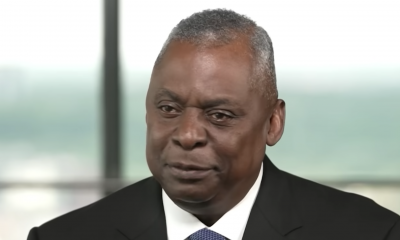National
BREAKING: Obama, Pentagon certify ‘Don’t Ask, Don’t Tell’ repeal
Military’s gay ban will be off the books in 60 days

President Obama and Pentagon leaders gave the green light on Friday to start the 60-day time period for when “Don’t Ask, Don’t Tell” will be off the books and openly gay Americans will be entirely free to serve in the U.S. military.
After consultation during a Friday meeting at the White House, Obama — along with Defense Secretary Leon Panetta and Chairman of the Joint Chiefs of Staff Adm. Mike Mullen — issued certification to Congress that the armed forces are ready for open service.
“Today, we have taken the final major step toward ending the discriminatory ‘Don’t Ask, Don’t Tell’ law that undermines our military readiness and violates American principles of fairness and equality,” Obama said in a statement. “In accordance with the legislation that I signed into law last December, I have certified and notified Congress that the requirements for repeal have been met. ‘Don’t Ask, Don’t Tell’ will end, once and for all, in 60 days—on September 20, 2011.”
Under the repeal law signed in December, the military’s gay ban will be lifted once the president, the defense secretary and the chairman of the Joint Chiefs of Staff certify the armed forces are ready for open service. Consequently, now that repeal has been certified, “Don’t Ask, Don’t Tell” will be off the books on Sept. 20.
“I believe the U.S. armed forces are ready for the implementation of the repeal of Don’t Ask, Don’t Tell,” Mullen said in a statement. “I conveyed that opinion yesterday to the President and to the secretary of defense, and today we certified this to Congress. My opinion is informed by close consultation with the service chiefs and the combatant commanders over the course of six months of thorough preparation and assessment, to include the training of a substantial majority of our troops.”
Aubrey Sarvis, executive director of the Servicemembers Legal Defense Network, said the “final countdown to repeal begins today” as a result of certification.
“Service members celebrate this historic announcement, and they are ready for this change,” Sarvis said. “Our nation’s top military leaders have testified that commanders see no significant challenges ahead, and now the president, Secretary Panetta, and Chairman Mullen have certified to Congress that the armed forces are prepared for the end of ‘Don’t Ask, Don’t Tell.'”
Alex Nicholson, executive director of Servicemembers United, said certification of repeal means gay service members can “breath a huge sigh of relief.”
“While we still must wait 60 days for this change to formally take effect and for the law to officially be off the books, this step is nothing short of historic,” Nicholson said. “This is the final nail in the coffin for the discriminatory, outdated, and harmful ‘Don’t Ask, Don’t Tell’ law.”
Gay service members who had left the U.S. military because of “Don’t Ask, Don’t Tell” hailed certification for repeal as an important milestone.
Stacey Vasquez, a former Army recruiter who was discharged under “Don’t Ask, Don’t Tell” in 2003, said she finds it hard to believe that the long struggle to end the military’s gay ban is finally coming to an end.
“I think it’s hard for me to put into words because there have been so many steps for me,” Vasquez said. “I went through a court battle for seven years and worked on repeal in my job for a year, and then I’ve lobbied Congress for nine years.”
She continued, “I don’t know if you’ve had one of those moments where you say, ‘Is it really done because you’ve had so many steps and you feel like you move forward and then you move back a step? I’m kind of thinking to myself, ‘Is it really done?'”
Still, Vasquez said she’s “happy” that certification has happened and plans to make an attempt to re-enlist in the Army after “Don’t Ask, Don’t Tell” is off the books.
Brian Fricke, a gay Iraq war veteran who left the Marine Corps in 2005 because of “Don’t Ask, Don’t Tell,” also said certification brings him a sense of relief. and vindication that he thinks is shared by other service members.
“For me, personally, there’s a sense of vindication,” he said. “When I left, I had a partner at the time and I was always afraid of being found out. I couldn’t relax when I was on my R&R away from work because I was fearful of that.
Additionally, Fricke said he thinks other service members will share his feelings following the formal lifting of “Don’t Ask, Don’t Tell.”
“I feel like a lot of the gay and lesbian troops are going to feel a lot of relief immediately, even if they’re not going to come out to people,” he said. “They are going to be able to relax when they’re off duty and be able to go in public to the movies and hold hands and not have to worry about retribution.”
Fricke wasn’t discharged under “Don’t Ask, Don’t Tell,” but opted not to enlist in 2005 because of the burden of serving under the military’s gay ban. He said he doesn’t plan to return to the armed forces.
Although “Don’t Ask, Don’t Tell” will remain on the books until Sept. 20, discharges under the anti-gay law have already been halted. The Pentagon earlier this month put in place a moratorium on separations in response to a court order imposing an injunction against enforcing the anti-gay law.
As a result, gay service members can already serve openly without fear of discharge, although openly gay people are still barred from enlisting in the armed forces.
The injunction — initially issued last year by a California federal district court — was reinstituted earlier this month by the U.S. Ninth Circuit Court of Appeals in the case of Log Cabin Republicans v. United States, pending litigation challenging the constitutionality of the military’s gay ban.
The moratorium on discharges could be lifted — making gay service members vulnerable once again — if the U.S. government succeeds in efforts to convince the court to place a stay on the injunction. On Monday, the Justice Department requested this stay and maintained the Obama administration wants an “orderly process for repealing” the military’s gay ban.
R. Clarke Cooper, Log Cabin’s executive director, issued a statement saying his organization’s lawsuit helped lead to “Don’t Ask, Don’t Tell” repeal certification.
“Log Cabin Republicans are proud to have helped put an end to ‘Don’t Ask, Don’t Tell,'” Cooper said. “It is our hope that the clear precedent established in federal court that will ensure an absolute end to this unconstitutional law.”
Even with “Don’t Ask, Don’t Tell” on its way to being off the books, supporters of open service say more work is necessary to ensure gay and straight service members stand on equal footing.
One option to address this issue is an executive order from the president that would ensure non-discrimination for gay service members. Currently, gay service members have no recourse outside of their chain of command if they feel they’re experiencing discrimination on the job.
Sarvis, who has called for such a directive since February, renewed his call this week for such an executive order on the basis that “every service member deserves equal respect in the work environment.”
“Signing legislation that allows for repeal of ‘Don’t Ask, Don’t Tell’ was necessary, but it is not sufficient for ensuring equality in the military,” Sarvis said. “It’s critical that gay and lesbian service members have the same avenues for recourse as their straight counterparts when it comes to harassment and discrimination.”
Other inequities exist between gay service members with partners or spouses and straight service members in marriages on issues such as living expenses and medical care, travel, housing benefits. Much of this inequity is because of the Defense of Marriage Act, which prohibits federal recognition of same-sex marriage.
LGBT advocates are also expressing concerns about transgender people still being unable to serve openly in the U.S. military. But openly transgender Americans can’t serve openly not because of law, but by regulation — so the change could be implemented administratively.
An executive order prohibiting discrimination against service members based on sexual orientation and gender identity would also stop the separations of service members who come out as transgender.
Mara Keisling, executive director of the National Center for Transgender Equality, issued a reminder on Friday that transgender Americans are still unable to serve openly in the armed forces.
“NCTE rejoices whenever discriminatory laws end and ‘Don’t Ask, Don’t Tell’ was a discriminatory law and it needed to go,” Keisling said. “However, as repeal is certified, transgender servicemembers continue serving in silence. NCTE looks forward to the day when the U.S. armed forces ends discrimination in all its forms.”
State Department
HIV/AIDS activists protest at State Department, demand full PEPFAR funding restoration
Black coffins placed in front of Harry S. Truman Building

Dozens of HIV/AIDS activists on Thursday gathered in front of the State Department and demanded the Trump-Vance administration fully restore President’s Emergency Plan for AIDS Relief funding.
Housing Works CEO Charles King, Health GAP Executive Director Asia Russell, Human Rights Campaign Senior Public Policy Advocate Matthew Rose, and others placed 206 black Styrofoam coffins in front of the State Department before the protest began.
King said more than an estimated 100,000 people with HIV/AIDS will die this year if PEPFAR funding is not fully restored.
“If we continue to not provide the PEPFAR funding to people living in low-income countries who are living with HIV or at risk, we are going to see millions and millions of deaths as well as millions of new infections,” added King.
Then-President George W. Bush in 2003 signed legislation that created PEPFAR.
The Trump-Vance administration in January froze nearly all U.S. foreign aid spending for at least 90 days. Secretary of State Marco Rubio later issued a waiver that allows the President’s Emergency Plan for AIDS relief and other “life-saving humanitarian assistance” programs to continue to operate during the freeze.
The Washington Blade has previously reported PEPFAR-funded programs in Kenya and other African countries have been forced to suspend services and even shut down because of a lack of U.S. funding. Two South African organizations — OUT LGBT Well-being and Access Chapter 2 — that received PEPFAR funding through the U.S. Agency for International Development and the Centers for Disease Control and Prevention in recent weeks closed down HIV-prevention programs and other services to men who have sex with men.
Rubio last month said 83 percent of USAID contracts have been cancelled. He noted the State Department will administer those that remain in place “more effectively.”
“PEPFAR represents the best of us, the dignity of our country, of our people, of our shared humanity,” said Rose.
Russell described Rubio as “ignorant and incompetent” and said “he should be fired.”
“What secretary of state in 90 days could dismantle what the brilliance of AIDS activism created side-by-side with George W. Bush? What kind of fool could do that? I’ll tell you who, the boss who sits in the Harry S. Truman Building, Marco Rubio,” said Russell.

U.S. Military/Pentagon
Pentagon urged to reverse Naval Academy book ban
Hundreds of titles discussing race, gender, and sexuality pulled from library shelves

Lambda Legal and the Legal Defense Fund issued a letter on Tuesday urging U.S. Defense Secretary Pete Hegseth to reverse course on a policy that led to the removal of 381 books from the Nimitz Library of the U.S. Naval Academy in Annapolis, Md.
Pursuant to President Donald Trump’s executive order 14190, “Ending Radical Indoctrination in K-12 Schooling,” the institution screened 900 titles to identify works promoting “diversity, equity, and inclusion,” removing those that concerned or touched upon “topics pertaining to the experiences of people of color, especially Black people, and/or LGBTQ people,” according to a press release from the civil rights organizations.
These included “I Know Why the Caged Bird Sings” by Maya Angelou, “Stone Fruit” by Lee Lai, “The Hate U Give” by Angie Thomas, “Lies My Teacher Told Me: Everything Your American History Textbook Got Wrong” by James W. Loewen, “Gender Queer: A Memoir” by Maia Kobabe, and “Democracy in Black: How Race Still Enslaves the American Soul” by Eddie S. Glaude, Jr.
The groups further noted that “the collection retained other books with messages and themes that privilege certain races and religions over others, including ‘The Clansman: A Historical Romance of the Ku Klux Klan’ by Thomas Dixon, Jr., ‘Mein Kampf’ by Adolf Hitler, and ‘Heart of Darkness’ by Joseph Conrad.
In their letter, Lambda Legal and LDF argued the books must be returned to circulation to preserve the “constitutional rights” of cadets at the institution, warning of the “danger” that comes with “censoring materials based on viewpoints disfavored by the current administration.”
“Such censorship is especially dangerous in an educational setting, where critical inquiry, intellectual diversity, and exposure to a wide array of perspectives are necessary to educate future citizen-leaders,” Lambda Legal Chief Legal Officer Jennifer C. Pizer and LDF Director of Strategic Initiatives Jin Hee Lee said in the press release.
Federal Government
White House sues Maine for refusing to comply with trans athlete ban
Lawsuit follows months-long conflict over school sports in state

The Justice Department is suing the state of Maine for refusing to comply with President Donald Trump’s executive order banning transgender athletes from participating in school sports, U.S. Attorney General Pam Bondi announced on Wednesday.
DOJ’s lawsuit accuses the state of violating Title IX rules barring sex discrimination, arguing that girls and women are disadvantaged in sports and deprived of opportunities like scholarships when they must compete against natal males, an interpretation of the statute that reverses course from how the law was enforced under the Biden-Harris administration.
“We tried to get Maine to comply” before filing the complaint, Bondi said during a news conference. She added the department is asking the court to “have the titles return to the young women who rightfully won these sports” and may also retroactively pull federal funding to the state for refusing to comply with the ban in the past.
Earlier this year, the attorney general sent letters to Maine, California, and Minnesota warning the blue states that the department “does not tolerate state officials who ignore federal law.”
According to the Maine Principals’ Association, only two trans high school-aged girls are competing statewide this year. Conclusions from research on the athletic performance of trans athletes vis-a-vis their cisgender counterparts have been mixed.
Trump critics and LGBTQ advocates maintain that efforts to enforce the ban can facilitate invasive gender policing to settle questions about an individual athlete’s birth sex, which puts all girls and women at risk. Others believe determinations about eligibility should be made not by the federal government but by school districts, states, and athletics associations.
Bondi’s announcement marked the latest escalation of a months-long feud between Trump and Maine, which began in February when the state’s Democratic governor, Janet Mills, declined to say she would enforce the ban.
Also on Wednesday, U.S. Education Secretary Linda McMahon said the findings from her department’s Title IX investigation into Maine schools — which, likewise, concerned their inclusion of trans student-athletes in competitive sports — was referred to DOJ.
Earlier this month, the Justice Department pulled $1.5 million in grants for Maine’s Department of Corrections because a trans woman was placed in a women’s correctional facility in violation of a different anti-trans executive order, while the U.S. Department of Agriculture paused the disbursement of funds supporting education programs in the state over its failure to comply with Title IX rules.
A federal court last week ordered USDA to unfreeze the money in a ruling that prohibits the agency from “terminating, freezing, or otherwise interfering with the state’s access to federal funds based on alleged Title IX violations without following the process required by federal statute.”
-

 District of Columbia5 days ago
District of Columbia5 days agoFinal push to raise funds, fill D.C. hotels as WorldPride nears
-

 El Salvador3 days ago
El Salvador3 days agoGay Venezuelan makeup artist remains in El Salvador mega prison
-

 District of Columbia4 days ago
District of Columbia4 days agoReenactment of 1965 gay rights protest at White House set for April 17
-

 Maryland5 days ago
Maryland5 days agoFreeState Justice: Transgender activist ‘hijacked’ Moore’s Transgender Day of Visibility event












